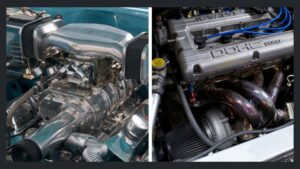
Supercharger vs. Turbocharger (Which is better?)
A gasoline engine’s combustion chamber needs a constant supply of air. This gives the engine additional power and improves performance. Most car owners think that all charging systems are the same. After all, they are both systems that compress air. When you hear words like supercharger and turbocharger, you think they mean the same thing.
However, these are two different charging systems, each with their own advantages and disadvantages. Let’s explore the differences between these charging systems. Compressor
The compressor supercharging system runs on engine power. This power comes from the engine crankshaft and belt. This means that there is virtually no delay in powering the compressor.
The engine crankshaft is always rotating, so it provides a constant flow of power. If you drive a vehicle with a slow engine, you need a compressor.
It gives the engine extra power to make up for the power it lacks. The best part is that a supercharger is less expensive than a turbocharger. In fact, there is no other supercharging system that is as affordable as a supercharger.
There are some disadvantages to using a compressor: The main drawback is that the engine is exposed to extra heat and high temperatures. This eventually reduces the engine’s lifespan.
The compressor’s lifespan is also reduced since it is also connected to the engine. During that time, the compressor receives power from the motor since the compressor relies on this power to function. This leads to reduced engine performance. Turbocharger
Turbochargers draw energy from the exhaust gases from the gas turbine. More air is forced into the combustion chamber, which increases the engine’s performance and efficiency. This is very beneficial in the case of vehicles with small engines that do not have as much power.
Turbochargers add extra power to the engine, allowing it to produce more power. At the same time, the engine’s power output also increases along with the power. Turbochargers work independently of engine power, so they have no effect on engine performance. This can lead to significant improvements in fuel economy and overall fuel economy.
Turbochargers also have their flaws. For example, they only have one speed range, because the exhaust gases generate additional power for the engine. This means that a turbocharger does not have a constant supply of power like a compressor. Turbochargers also heat up quickly, so you may need to change your engine oil more frequently.

